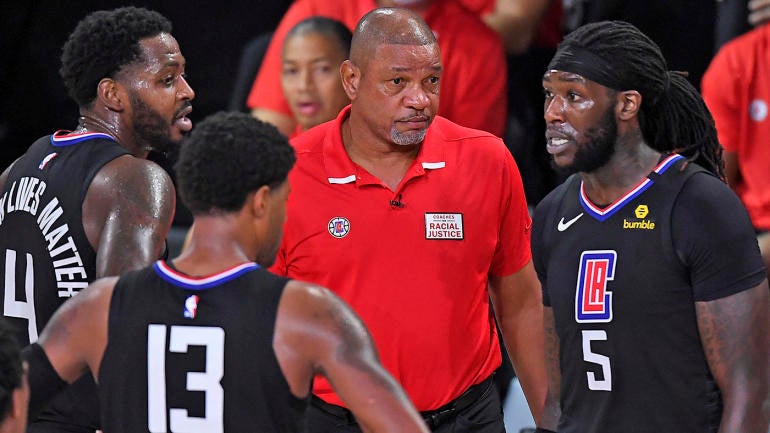
Normally, if the preseason championship favorite blows a 3-1 lead in the second round of the playoffs, a coach firing would require little by way of explanation. This is particularly true if said team had a double-digit lead in the second half of each of its last three games.
The 2019-20 Los Angeles Clippers season fell apart with three separate collapses. And yet, when they fired Doc Rivers on Monday, it was a stunner. This is because of Rivers' stellar resume, and because he has meant so much to the franchise for the past seven years. It is also because, 13 days after their Game 7 loss to the Denver Nuggets, their playoff exit still seems so strange.
At times this postseason, the Clippers looked like the potential champions they were supposed to be. After Game 1 of the Nuggets series, one could credibly argue Kawhi Leonard was the best player in the league -- he'd just scored 94 points on 38 for 58 shooting in three games: A 154-111 win against Dallas, a 111-97 win against Dallas and a 120-97 win against Denver. But when Los Angeles went cold, it was absolutely frigid.
Each time the Nuggets erased a deficit, they did so with poise and precision. They targeted the Clippers' weaker defenders, bent their defense and found high-percentage shots. When plays broke down, their stars made some low-percentage ones, too. It was a stark contrast to what was happening on the other end, as Los Angeles looked unsure of itself, disjointed and disconnected.
Typically, this would be enough to justify firing a coach. And surely Rivers bears some of the responsibility. But if the idea behind this move is that someone had to be held accountable, then it's worth asking why it should be Rivers. It's also worth asking what exactly happened in those collapses.
On the latter question, there were all sorts of factors:
- The Nuggets played shockingly effective defense, both one-on-one and helping and recovering when the Clippers' stars put the ball on the floor.
- The Clippers didn't respond to the heightened pressure by moving the ball and making the defense think.
- The Clippers' defensive problems compounded their offensive issues because they had to go against Denver's set defense.
- The Clippers weren't in good enough condition, so they were running out of steam and making mental mistakes.
There are a few popular answers for the former:
- Rivers could have played JaMychal Green (or even Marcus Morris) more at center, since they were getting destroyed in Montrezl Harrell's minutes and Nikola Jokic was cooking Ivica Zubac.
- Rivers could have played Lou Williams more, just to give the Clippers more juice on offense.
- Rivers could have had Leonard guard Jokic more often.
- Rivers could have used different coverages against Jamal Murray and Jokic's two-man game; switching could have cut down on Jokic's pick-and-pop 3s.
It is fair to say that Rivers didn't find a rotation that worked against the Nuggets and couldn't get his team to play with enough purpose when it counted. Perhaps that is damning. The Los Angeles Lakers are in the NBA Finals despite having to make difficult decisions with regard to playing time, balancing defense with offense and size with mobility. It is difficult to find an analyst who argued that the Clippers were the less versatile of the two Los Angeles teams.
I'm not sure, however, that there was a perfect solution to the Clippers' problems, and we'll never know how much these problems would have mattered against Denver if Harrell hadn't had to leave the bubble after the death of his grandmother and if Patrick Beverley hadn't repeatedly been in foul trouble. Los Angeles has been roundly criticized for its lack of cohesion, and Williams even said they didn't have enough chemistry, a few months after saying they would laugh at people outside of the locker room who said exactly that. The Clippers rarely had their full roster available, though, in the pre-bubble portion of the season and in Orlando.
Maybe they would have won the title in normal circumstances. I suspect, though, that they made errors in roster construction, undervaluing passing and underestimating how difficult it would be to cover for weak defenders. Either way, Rivers is losing his job partially because of factors beyond his control, a year after his presence helped the team lure Leonard and George.
Rivers told the Los Angeles Times about a year ago that, in the Clippers' pitch meeting with Leonard, the superstar pointed at him and said, "I want to play for you." Leonard then told owner Steve Ballmer that he wouldn't sign with them if they didn't improve the roster. By trading almost everything they had for George, they were able to win the summer. As Rivers said, though, the Clippers were "trying to win the season," not just the summer.
Winning the season is a lot more complicated. If they're going to do it next year, they're going to need to change more than just the coach.


















